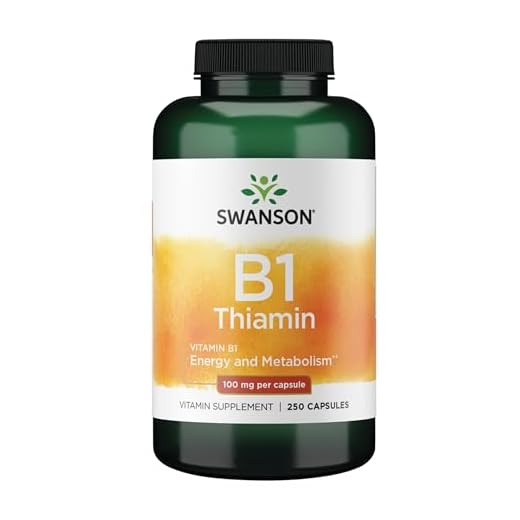






Vitamin B1, also known as thiamin, is essential for your carbohydrate metabolism. It acts as a cofactor for key enzymes like pyruvate dehydrogenase, which converts pyruvate into acetyl-CoA, linking glycolysis to the citric acid cycle. This process is critical for transforming carbohydrates into usable energy. Additionally, thiamin supports the decarboxylation of alpha-ketoglutarate within the citric acid cycle, further enhancing energy production. Maintaining adequate thiamin levels is key for overall metabolic health, and you can find it in foods like whole grains, lean meats, and legumes. There's more to discover about its benefits and sources.
Key Takeaways
- Thiamin acts as a cofactor for pyruvate dehydrogenase, facilitating the conversion of pyruvate to acetyl-CoA in carbohydrate metabolism.
- This conversion links glycolysis to the citric acid cycle, crucial for energy production from carbohydrates.
- Thiamin supports the decarboxylation of alpha-ketoglutarate within the citric acid cycle, enhancing metabolic efficiency.
- Adequate thiamin levels promote overall metabolic health by ensuring proper carbohydrate utilization.
- Deficiency in thiamin can impair energy production and lead to symptoms like fatigue and confusion.
Role of Thiamin in Metabolism
In the intricate web of carbohydrate metabolism, thiamin (vitamin B1) plays a pivotal role as a cofactor for essential enzymes. Specifically, it's significant for the enzyme pyruvate dehydrogenase, which converts pyruvate into acetyl-CoA. This conversion is fundamental, as it links glycolysis to the citric acid cycle, facilitating energy production from carbohydrates. Thiamin also assists in the decarboxylation of alpha-ketoglutarate within the citric acid cycle, enhancing your body's ability to generate energy efficiently. Additionally, adequate levels of thiamin may support overall metabolic health, similar to how Vitamin B6 helps alleviate morning sickness during pregnancy.
Moreover, thiamin is integral to the pentose phosphate pathway, where it helps convert glucose into ribose-5-phosphate. This step is necessary for nucleic acid synthesis and overall cellular metabolism. Without adequate thiamin, your body may struggle with carbohydrate metabolism, leading to increased lactate production and potential lactic acidosis. This occurs due to the impaired conversion of pyruvate to acetyl-CoA, which can hinder energy production.
The Recommended Dietary Allowance for thiamin stands at 1.2 mg/day for adult males and 1.1 mg/day for adult females, underscoring its essential role in supporting efficient carbohydrate metabolism.
Sources of Vitamin B1
Many people might not realize just how vital vitamin B1, or thiamine, is for a balanced diet. To maintain adequate levels, it's imperative to include a variety of thiamine-rich foods in your daily meals. Whole grains are primary sources, with brown rice, whole wheat bread, and fortified cereals providing considerable amounts of this important nutrient. Additionally, NOW Supplements, Vitamin B-1 100 mg can be an effective way to guarantee you meet your daily thiamine needs.
Lean meats, particularly pork, and fish such as trout and bluefin tuna are also excellent sources, contributing considerably to your dietary intake of thiamine. If you're looking for plant-based options, legumes like black beans, lentils, and peas, as well as nuts and seeds—especially sunflower seeds—offer substantial vitamin B1 content.
While vegetables like asparagus and spinach contain thiamine, they provide it in smaller amounts compared to other sources. For adults, the recommended daily intake of vitamin B1 is approximately 1.2 mg for men and 1.1 mg for women. By incorporating these diverse thiamine-rich foods into your diet, you can support ideal carbohydrate metabolism and overall health. Remember, a balanced diet is key to guaranteeing you meet your vitamin B1 needs effectively.
Symptoms of Thiamin Deficiency
Thiamin deficiency can have serious consequences for your health, leading to a range of symptoms that affect both physical and mental well-being. Early signs include fatigue, weakness, and confusion, which can escalate into more severe neurological complications if left untreated. In the case of alcoholics, thiamin deficiency often leads to Wernicke-Korsakoff syndrome, characterized by ataxia, confusion, and significant memory disturbances. Adequate levels of thiamine are essential for energy metabolism in nerve cells, and maintaining proper intake can help prevent these serious health issues, including neurological issues.
Additionally, you may experience cardiovascular problems related to thiamin deficiency, such as tachycardia, fluid retention, and an enlarged heart. These symptoms arise because vitamin B1 plays a key role in energy metabolism, and its absence can disrupt normal physiological functions. If your thiamine levels drop to marginal thiamine, the risk of developing further complications increases, including peripheral neuropathy, which manifests as tingling or numbness in the extremities.
Prolonged deficiency can lead to alarming symptoms like seizures, vomiting, and anorexia, underscoring the importance of maintaining adequate thiamin intake. By recognizing these symptoms early, you can take proactive steps to address potential thiamin deficiency and safeguard your overall health.
Recommended Daily Intake
To maintain ideal health and support crucial functions like carbohydrate metabolism, it's important to meet the Recommended Dietary Allowance (RDA) for vitamin B1, or thiamin. For adult males, the RDA is set at 1.2 mg/day, while adult females require 1.1 mg/day. Infants need 0.2 mg/day up to 6 months and 0.3 mg/day from 7 to 12 months. As children grow, their needs vary: those aged 1-3 years require 0.5 mg/day, and children aged 4-8 years need 0.6 mg/day. Kids aged 9-13 years should aim for 0.9 mg/day.
Pregnant women have increased thiamin requirements, with a recommended intake of 1.4 mg/day, and breastfeeding mothers should consume 1.5 mg/day to support both their health and the glucose metabolism of their infants. Achieving the recommended daily intake can be easily accomplished through a balanced diet rich in whole grains, fortified cereals, and lean meats. While dietary supplements can help, focusing on whole food sources is essential for ideal thiamin levels and effective carbohydrate metabolism.
Thiamin Supplementation and Safety
Meeting the recommended daily intake of vitamin B1 is vital for your health, but some individuals may still struggle to get enough through diet alone. In these cases, thiamin supplementation can be beneficial, particularly for at-risk populations such as those with alcohol dependency, malnutrition, or gastrointestinal diseases. These groups may experience thiamin deficiency, which can severely impact carbohydrate metabolism and overall metabolic functions.
High-dose thiamin, often administered intravenously or intramuscularly for 3-5 days, is essential in treating Wernicke encephalopathy, a serious neurological condition linked to thiamin deficiency. Fortunately, thiamin supplements are generally considered safe, with a low risk of toxicity. Any excess amounts are typically excreted through urine, minimizing potential adverse effects.
However, you might experience mild gastrointestinal discomfort, such as nausea or stomach ache, which usually resolves quickly. It's important to consult with a healthcare provider before starting thiamin supplements, especially if you have existing health conditions or take medications that could affect thiamin absorption. This precaution will help guarantee your safety while supporting your carbohydrate metabolism effectively.
Conclusion
In the grand scheme of health, it's ironic how often we overlook Vitamin B1, the unsung hero of carbohydrate metabolism. While you might be busy counting calories, remember that without adequate thiamin, your body struggles to convert those carbs into energy. So, if you find yourself feeling sluggish despite your healthy eating habits, perhaps it's time to give thiamin the credit it deserves. After all, who knew that such a tiny nutrient could wield such power over your well-being?



